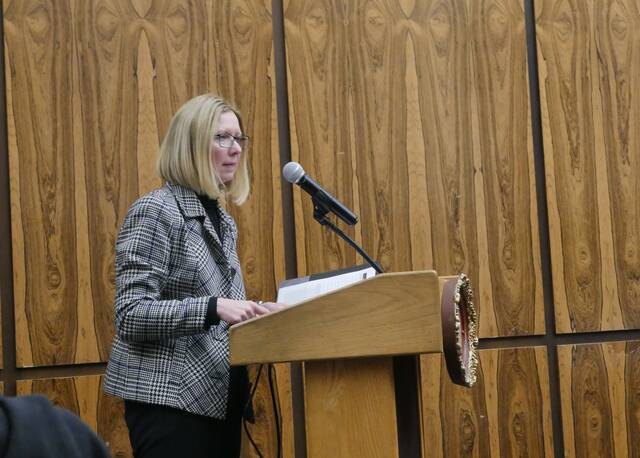
Newly confirmed county Operational Services Division Head Michele Sparich presents her proposed 2026 budget during Monday’s council work session.
Jennifer Learn-Andes | Times Leader
Luzerne County Council confirmed county grant writer Michele Sparich’s appointment Monday as the new operational services division head.
All nine members in attendance approved the confirmation — a step required for the county’s eight division heads. The council members in support: Harry Haas, Patty Krushnowski, Chairman John Lombardo, LeeAnn McDermott, Chris Perry, Jimmy Sabatino, Brittany Stephenson, Vice Chairman Brian Thornton and Greg Wolovich.
Council members Joanna Bryn Smith and Kevin Lescavage were absent.
The operational services division head oversees engineering, roads and bridges, planning and zoning, 911, emergency management, buildings and grounds, the boiler plant, and solid waste management.
Sparich will receive $98,800 annually and continue to handle grant writing duties.
The position is open because Jennifer Pecora left at the start of the year to accept employment outside county government.
Sparich had served as acting operational division head and also previously acted as temporary overseer of the human services division and administrative services division during periods when those positions were vacant. She has worked for the county since 2004.
“I’m excited to move forward as a permanent operations division head,” Sparich said after Monday’s meeting, adding she is “very appreciative” of the support from council and county Manager Romilda Crocamo, who nominates division heads to council.
“The departments within this division have many dedicated and hard-working employees, and I’m looking forward to working with them to move the county forward,” Sparich said.
Thanking council for its “overwhelming support” for the hiring, Crocamo said Sparich is an “exceptional individual” and a “beacon of innovation and intelligence” who has been “moving our county forward over the decades.”
“What sets Michele apart is her unwavering commitment to leading by example,” Crocamo said. “She embodies the values we hold dear: integrity, dedication, and service. Her work has not only transformed policies and programs but has also fostered a sense of unity and purpose among us all. We all have seen firsthand how her leadership galvanizes teams, encouraging collaboration and a shared vision for a brighter future.”
Opioid earmarks
Council approved two of three proposed opioid settlement fund earmarks on Monday’s agenda.
The requests were advanced to council by the county’s Commission on Opioid Misuse and Addiction Abatement, which was created to make recommendations on how to spend funds received from the state’s settlement against opioid manufacturers and wholesale distributors.
The two approved:
• $500,000 for Wyoming Valley Behavioral Health, an inpatient psychiatric hospital on Wyoming Avenue in Kingston that treats patients with serious mental illnesses and co-occurring substance use disorders. The funds will expand and enhance its adult inpatient program to “meet the rising demand for crisis-level psychiatric and opioid use disorder care” in the county and alleviate the burden on hospital emergency departments and emergency responders, its submission said.
• $69,400 for the nonprofit Pathway to Recovery Counseling and Educational Services to cover costs associated with providing its eight-month Too Good for Drugs prevention program in three school districts — sixth through eighth grades at Hazleton Area; sixth grade at Crestwood; and sixth through twelfth grades at Hanover Area.
A council majority did not support the final $131,360 allocation to cover chiropractic services intended to prevent acute and chronic pain sufferers from turning to addictive opioid medication.
Dr. Jeff Lewis, the owner of Lewis Chiropractic in Hanover Township, submitted the application to provide chiropractic treatment to those without insurance or with insurance that does not cover the service. He is calling the new program the “Alternatives to Opioid Medication in Chiropractic (ATOMIC) Initiative.”
Several council members raised questions and concerns about the proposal during the last work session, in part because it differs from the types of programs and services funded in the past.
Three council members —Haas, McDermott and Wolovich — voted for the earmark, but the remaining six did not.
Lewis said after the vote he believes council “missed a great opportunity to think outside the box and help the most vulnerable of their citizens.”
“Rejecting the Atomic Program based on its uniqueness and the possibility of other practitioners aiming to use opioid funds to help those seeking non-drug alternatives doesn’t seem very forward-thinking given the fact that the County Commission on Opioid Misuse and Addiction Abatement offered its recommendation,” Lewis said.
Property sales
Council unanimously approved procedures to sell two county-owned properties.
The county will seek proposals from commercial real estate brokers to market and sell a three-story brick structure at 54 W. Union St. in Wilkes-Barre that previously housed community development. It is appraised at $373,000. Another vote will be necessary to approve a selected broker.
Several council members had said a broker listing would reach more potential buyers.
For the other property — the Broad Street Business Exchange at 100 W. Broad St. in Hazleton — the county will publicly seek proposals, with the minimum price set at the $2.1 million appraised value, council agreed. This approach was advocated by several council members and the administration to save the expense of a broker commission because buyers are already interested.
Blighted property
A council majority adopted a new ordinance that will impose a $100 fee on properties purchased in county delinquent tax sales and mortgage foreclosure auctions to generate revenue for a new county demolition and rehabilitation fund.
Fee revenue will be deposited in a segregated interest-earning bank account. County Council could use the funds for county demolition and rehabilitation projects, and may award funds to municipalities, school districts, redevelopment authorities, land banks, and other nonprofit entities to demolish or rehabilitate blighted properties, the agenda said.
Haas provided the lone no vote, saying he believes a more specific plan is needed on how the funds will be allocated.
Stephenson said the proposal is solid and will yield “tangible results” in targeting blight.



